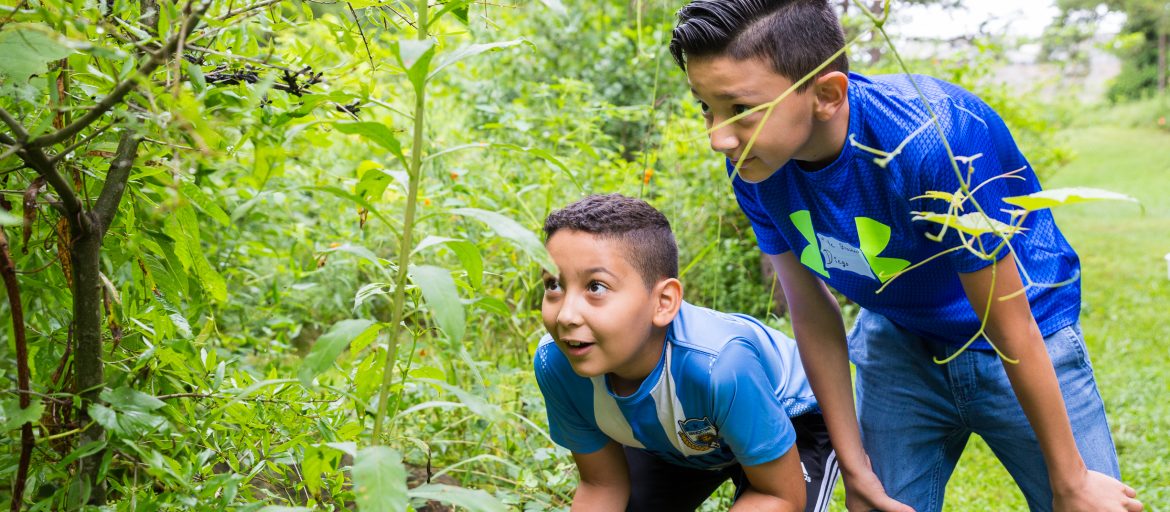Really, what’s more impressive than young kids going totally nerdy for science? These middle and high school students from all around Buncombe County are part of the Migrant Education Program at Buncombe County Schools, and they got to spend two weeks this summer as scientists at UNC Asheville’s “Science on the Move” summer camp. The new program is designed to help close the “opportunity gap” in science education and exposure to college for rural, migrant youth in Buncombe County, thanks to a $174,948 Student STEM Enrichment Program grant from the Burroughs Wellcome Fund. And it’s just getting started, with two more summers planned.
But first a recap of this summer and what the students did.
#1. They actually had a blast at a science summer camp.
While the rest of us were probably burying our heads deeper under the blankets during our middle and high school summer breaks, these kids were up and conducting science experiments—and loving it.
Every day included new scientific activities for the students, both indoors and outdoors, from building a potato battery to dissolving eggshells in vinegar to tie-dyeing bandanas with natural dyes made from blueberries and turmeric (there was a food theme to the camp this year). Irene Rossell, chair and professor of environmental studies at UNC Asheville, said the students particularly loved getting to use the scientific equipment, like beakers and test tubes and eyedroppers, and zoom microscopes to examine insects they collected.
“They had so much fun,” said Rossell, who taught in the camp alongside New Media Professor Lei Han and Assistant Professor of STEM Education Evan Couzo. “They could look at the actual mouthparts of a very tiny insect. They loved that.”
Who wouldn’t?
#2. They genuinely helped each other.
“We had some English language learners, which was a new experience for me, because I had always taken for granted that my students could understand me,” Rossell said. While the program did have translators to assist, Rossell said the greatest help came from the kids themselves.
“The kids never let another student not understand what was going on in the classroom,” she said. “They worked really well together and helped each other stay on track.”
It all adds up to an awesome experience.
#3. They’re curious.
Curiosity is such a valuable trait for a student—or for any human being, really. These students had the chance to ask real scientists any question they wanted, and they didn’t waste the opportunity. UNC Asheville science professors visited the camp to tell students about their careers in physics, meteorology, wildlife biology, chemistry, and computer animation.
“They asked really good questions,” Rossell said. “They asked (Atmospheric Sciences Professor) Chris Godfrey, ‘have you ever been inside a tornado,’ ‘is your job dangerous,’ ‘how much money can you earn in this type of career,’ ‘why did you pick this career,’ and one person asked, ‘why do you live in Asheville if you study tornados?’”
These kids are on the ball.
#4. They’re also artists.
Photo and video artists, to be exact. The students used iPads to photograph and video their experiences and experiments—the iPads also let them investigate further into their nature walks (insect collecting was a favorite activity) with sound recordings, slow and fast motion videos, and online research.
“While we were looking at the praying mantis, we could look up what it eats, and where it lives,” Rossell said. “We did a lot of that, spontaneous research on different insects.”
Professor of New Media Lei Han taught the students how to do stop motion animation, which Assistant Professor of STEM Education Evan Couzo later had students use to show oxidation of organic matter (aka apple slices browning when left in the open). Han also taught them basic video and photography editing skills, and the students put together their own video projects to show their parents at the end of the camp.
“The kids were so proud of what they were doing,” Rossell said. “They were really excited for the parents to come.”
#5 They aren’t done yet!
Plot twist: this wasn’t a summer camp!
OK, it was a summer camp, but it’s not just a summer camp. The program actually continues throughout the school year via an online science club. Plus, the students will have the opportunity to come together again for three different field trips, including a trip to a local creamery to see how animals are milked and fed and how cheese is made, and to talk to farm managers, “who are also food scientists,” Rossell explained.
For more information contact Irene Rossell at irossell@unca.edu or 828.232.5185.

Share
Permalink: